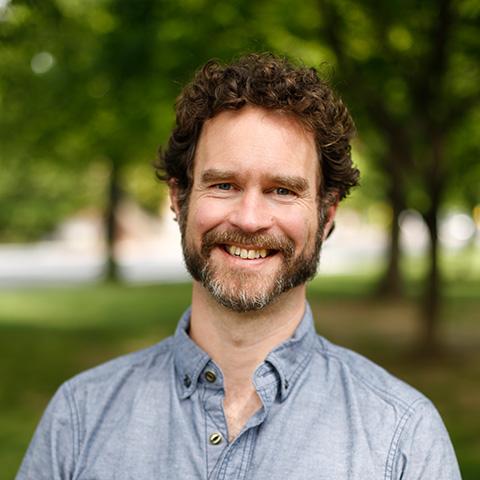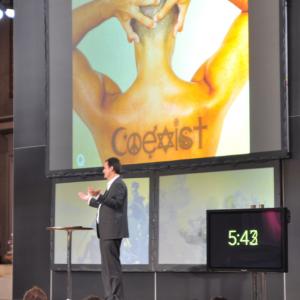
Timothy McMahan Kingis a writer, senior fellow for clergy for a New Drug Policy, and the owner of Vagabond Strategies. He is the former chief strategy officer for Sojourners and has served as a consultant for national nonprofits, advocacy campaigns, and political candidates. The author of Addiction Nation: What the Opioid Crisis Reveals About Us (Herald Press, 2019), he is an active advocate for those in recovery and to reform United States drug policy. His second book, What Are Drugs For? is forthcoming with Fortress Press. He has written widely for national publications, including The Wall Street Journal and CNN.
He's spoken and lectured across the country from Georgetown University to the Chautauqua Institution. His writing is required reading in classrooms and graduate programs across the country for his unique perspective at the intersection of faith, science, drugs, and addiction while calling for an end to a culture of punishment.
A graduate of North Park University with degrees in theology and philosophy, McMahan King has a deep interest in what healing looks like for the individual and our culture. Growing up on a farm in New Hampshire, he has a keen awareness of the ways in which our communities and the natural environment can call us into greater wholeness.
McMahan King lives with his wife, Hannah; their daughter, Ruth; and their dog, Hank, in North Carolina.
Posts By This Author
Wrath: The Deadly Sin of the Divine
Wrath is the only one of the Seven Deadly Sins we attribute to God. And, as pastor Bob, my confirmation teacher in 8th grade would be glad to know I remember, the definition of sin according to the catechism of the Evangelical Covenant Church and similar to most Christian traditions is that sin is “all in thought word or deed that is contrary to the will of God.”
This definitional conundrum raises a few questions. Is it wrong to speak of God’s wrath? Wrong to list wrath among the Deadly Sins? Or are there certain things that are only sins if humans do them but are appropriate to the Divine?
I would argue that yes, wrath can be sinful, but it is not necessarily so. And that during this Lenten season the challenge is not always to suppress wrath but expressing a wrath that is in fact the appropriate response to injustice we see around us every day. In fact, a misguided attempt to avoid wrath can lead to a sin of omission in the failure to practice the “Cardinal Virtue” of justice.
Shooting at the Family Research Council Offices
Another senseless act of violence today was targeted at the Family Research Council. A security guard is now in stable condition at a local hospital after being shot in the arm by a 28-year-old assailant. The suspect is now in custody. Multiple outlets are reporting that the young man specifically intended to attack FRC staff because of their conservative advocacy.
My prayers goes out to the security guard and his family as he recovers. His actions may have saved the lives of many. Washington, D.C., Police Chief Cathy Lanier said, “The security guard here is a hero, as far as I’m concerned.”
My heart is with the rest of the FRC staff. Their place of work will not feel safe after this. It will undoubtedly be difficult knowing there are those who would do violence against you because of your convictions.
Is Michelle Obama a 'Missional' Christian?
With approval ratings a good 15 points higher than her husband, there are probably some strategists wishing they could run the Michelle Obama re-election campaign right now. While the White House legal counsel looks into the constitutionality of a husband/wife switch, the campaign is trying to put her popularity to work.
Last week, the First Lady spoke to the quadrennial General Conference of the African American Methodist Episcopal Church. While the speech was a get-out-the-vote plug, it also shed an interesting light on both her personal faith and the theological tradition of the nation’s oldest independent, predominantly African-American congregations.
In reading the First Lady’s speech, I was intrigued to see a strong emphasis on some concepts I often associate with “missional” churches.
Former Barclays CEO Feels 'Responsible,' Not 'Culpable'
The WSJ is reporting today on the testimony of Robert Diamond, the recently resigned CEO of Barclay’s before the British Parliament:
"A day after abruptly resigning amid a mushrooming scandal over interest-rate manipulation, former Barclays PLC chief Robert Diamond on Wednesday was assailed by British lawmakers for the bank's actions, in a preview of the scrutiny likely to lie ahead for other big lenders that are under investigation."
What caught my eye in particular, was the WSJ choice of a pull quote from Diamond’s testimony on the front page:
"I don’t feel personal culpability. What I do feel is a strong sense of responsibility."
In other words, he feels that he is somehow accountable for the wrongdoing in his organization but he also does not deserve blame or consequences for what has been done. To see the tenuous nature of his logic you just need to invert the situation.
If Barclays was having a year of record profits would there be any set of possible circumstances in which he would forgo his bonus by saying that while he was responsible for the growth he did not deserve the rewards? If not, why would we buy the argument that while he is ultimately responsible for the company’s wrongdoings he does not deserve the blame and resulting consequences?
Retelling the Story
North Park University might be the only evangelical college in the country with a school-sanctioned student group that includes the word “queer” in its name. Like many other evangelical schools, North Park has had unofficial clubs or informal meetings of students to talk about issues of sexuality, but two years ago a proposal was accepted by the student senate to make “Queers and Allies,” or Q&A, an official student club. The core leadership team is small, but events often attract between 35 and 75 students to hear various perspectives and discuss topics ranging from interpretations of scripture to “queer history” and understandings of gay identity.
There has been no public opposition to the club’s existence, says Rick Sindt, one of the group’s student founders and leaders. “The overall atmosphere is ambiguous,” Sindt says. “There are institutional policies in place that hinder faculty from being out or even vocal.” But still, he says, encouragement both on campus and from alumni has been “abundant.”
North Park upholds the teachings of its sponsoring denomination, the Evangelical Covenant Church, which prohibits the ordination of openly gay clergy and does not allow for its pastors to perform same-sex weddings, unions, or blessings. Still, Sindt, who is gay, is actively involved in campus ministries and the spiritual life of the college. He recently gave his testimony at a chapel service and traveled to India for a service and mission trip. While it has been hard for him to find a church home, he remains dedicated to his faith.
What is Post-Candidate Politics?
For a lot of voters, President Barack Obama’s tenure hasn’t turned out quite as they hoped. On the other side, the presumptive GOP nominee, Gov. Mitt Romney, isn’t the candidate that many voters seem ready to believe in.
Traditional political parties are in decline. In December 2011, Gallup reported that 45 percent of the U.S. population identified as politically independent. At the same time, the direction of our two parties is more and more influenced by political movements like the Tea Party and Occupy Wall Street.
While there is an unprecedented level of money flowing into elections from wealthy donors, corporations and unions, social media has democratized access to fellow voters. You can spend millions of dollars buying airtime on traditional TV stations—but it is entirely possible to craft a compelling message that will reach millions for a relatively small cost.
A politically disillusioned electorate and a huge influx of money for attack ads will be a challenge to our country’s democratic processes. The danger, especially for my generation, is to tune out from political and civic engagement entirely.
The opportunity is post-candidate politics.
Ryan Budget is a Present-Day 'Hunger Games'
Melissa Boteach of Half-in-Ten—the campaign to cut poverty in half in 10 years—is using the Katniss defense against the Ryan budget cuts.
The world that Suzanne Collins paints in the The Hunger Games is one in which only the strong survive. Those that can’t keep up are cut out, kind of like the Ryan budget.
One of the radical things about the ethical agenda that Jesus promoted was the place he offered to the sick, the weak and the weary. He flipped common understanding of who was “deserving” and who was “undeserving” upside down.
The Catholic Bishops have now come out with their concerns about the Ryan budget and how it abandons the poor and the hungry. Take a look at Melissa’s chart, what do you think?

Lobbyists Spend A Lot of Money to Make Your Taxes Confusing
I finished up my taxes last night. I didn’t think much of the hour I spent on the phone with my dad making sure I filed correctly. Taxes are always complicated, right?
Well, maybe that’s because the folks at Intuit (the publishers of TurboTax) want them to be.
Matt Stoller over at Republic Report pointed out that the ReadyReturn program in California sends tax payers a form showing how much they owe in taxes. Then they just sign it and send it back. It costs less for the state to process and it saves tax payers a lot of time.
During the 2008 campaign, President Barack Obama promised to implement something similar on the federal level. What happened?
Stoller also notes that since 2008, Intuit has spent a good $9 million on lobbying. And according to one of their investor reports, keeping taxes complicated is a top priority:
Our consumer tax business also faces significant competition from the public sector, where we face the risk of federal and state taxing authorities developing software or other systems to facilitate tax return preparation and electronic filing at no charge to taxpayers. These or similar programs may be introduced or expanded in the future, which may cause us to lose customers and revenue. For example, during tax season 2010, the federal government introduced a prepaid debit card program to facilitate the refund process. Our consumer and professional tax businesses provide this service as well.
If that doesn’t make you mad, take a look at why you are probably paying $500 more a year for your cell phone then you should be.
Q Conference - Ross Douthat: A Conservative in the Belly of the 'Beast'
Just a few years ago, Ross Douthat earned the distinction of becoming the youngest regular columnist the New York Times has ever employed. He also has the unique position of being a conservative Christian in the belly of what some Christians might consider the proverbial “beast.”
So, how's that going for him?
“It’s been wonderful,” he told Michael Cromartie, Vice President at the Ethics and Public Policy Center, during an onstage interview at the Q Conference in Washington, D.C. Tuesday evening.
The conversation focused on the themes of Douthat’s new book, Bad Religion: How We Became a Nation of Heretics.
Q Conference Brings Together Christian Leaders
The annual Q conference has begun. In it’s 5th year, the conference has come to Washington, D.C. and brought together about 700 thought, spiritual and cultural Christian leaders.
Modeled after the “TED Talks,” the conference gives opportunity to a wide variety of speakers short segments, between 3, 9 and 18 minutes, to express ideas that can—or should be—shaping Christianity and the broader culture.
Won't Get Fooled Again
In an attempt to discredit the Industrial Areas Foundation (IAF), a young conservative activist created a fake Facebook page and website for a non-existent environmental group. Then, posing as someone interested in organizing a union, tried to get a local organizer to give him tips on shaking down politicians. The New York Times reports:
At this point, Rhea Byer-Ettinger, an organizer for Manhattan Together, felt her internal baloney detector go on red alert. “Beep, beep, beep,” she said. “I said to him: ‘Well, that’s not how we work. Tell me, why are you asking me about that?’ ”
As a former employee of an IAF affiliate in Chicago, I’m really not sure what this young guy was hoping to find. I’m sure in any large organization you could find someone to secretly record who might say something that could sound unflattering. But, was he really expecting a nationwide crime syndicate that uses collective bargaining as a tool to extort money or favors from politicians?
Passionate and sincere disagreement about politics is a good and healthy thing but tactics of this young activist and others like James O’Keefe show something dangerous. It’s the assumption that those who disagree with you politically aren’t just wrong, but evil.
On the other end, this means progressive activists should ask themselves if folks like the Koch brothers are “evil” or just some really rich dudes with politics they don’t like.
These Dry Bones
It had been more than a week since the doctors had moved me into the ICU, and more than a week since I had tasted anything liquid.
My tongue was dry and felt like leather. At night, I would watch the machines around me blink. The IV bags hung next my bed and scattered the light across sterile white walls.
 I tried not to cry when I could no longer control my bowels. I lay there in my own filth waiting for a nurse to rescue me.
I tried not to cry when I could no longer control my bowels. I lay there in my own filth waiting for a nurse to rescue me.
I came into the world unable even to clean myself and now it seemed I would leave it in the same state.
Finally the nurse arrived to help me.
“I’m thirsty,” I told her. “May I have an ice cube?”
She said no.
“Please? My mouth is so dry. Just an ice cube,” I begged.
“No.”
Oxygen tubes inserted into my nostrils had rubbed my nose raw. I pulled them out.
I felt relief. I watched the numbers drop on the LCD screen. An alarm sounded.
I tried to put the tubes back when the nurse ran in.
“Mr. King, you need the oxygen,” she chided, skillfully replacing al the tubes and checking all the machines and medicines that flanked my hospital bed — all the things that were keeping me alive.
Same Budget Problems, New Budget Year
This morning, Congressman Paul Ryan (R- WI), chairman of the House Budget Committee, released a proposal for an FY 2013 budget. Similar to last year, the plan places an undue burden of deficit reduction on low-income people. Effective anti-poverty programs are targeted for cuts while a tax plan that could significantly reduce tax burdens for top income earners.
According to analysis from Bread for the World:
This FY 2013 budget proposal would have a devastating impact on programs like the Special Supplemental Nutrition Program for Women, Infants, and Children (WIC), the Supplemental Nutrition Assistance Program (SNAP, formerly food stamps), low-income tax credits, and would make international food aid and poverty-focused foreign assistance vulnerable to cuts that would undermine our national security.
The proposed budget would cut SNAP by turning it into a block grant program. This would prevent the program from responding when there is an increase in need. Once the money from the block grant is spent, there cannot be an increase in funds. Currently, SNAP automatically increases with need.
Tithing: No Buts About It
Throughout my salad years, I gave as I could — probably somewhere around the national average. But that was the problem.
I gave as I could, but never as I was called to do. By God.
I realized that I had been lying to both myself and God. I was never a “poor” college student. I was never a “poor” non-profit worker. I was never a “poor” young professional in D.C.
When I was in school, with very little expendable income, I still received a quality education, had consistent access to food, my housing was stable, and I had health insurance. My starting salary after college put me above the national poverty threshold (about $24,000 a year… for a family of four).
Then I took a look at the Global Rich List, which calculates your income compared to the global population. I realized I was quickly approaching the 1 percent. That’s right. In global terms, I wasn’t there yet, but I was well on my way to becoming a card-carrying member of the global elite — the dreaded 1 percenters.
Yup, all it takes to hit the top 1 percent of global income earners is to make $47,500 a year.
(Home) Schooling Bill Maher
Last Friday, on his weekly show Real Time with Bill Maher, the not-so friendly atheist, Mr. Maher took issue with the Santorum families decision to homeschool their children. Here’s what he said:
"But I bring up the old tale of the poisoned apple — no, not "Snow White," that's a fairy tale — because the Adam and Eve story is taken literally by half the country and it's no coincidence that the type of tree which god forbade Adam and Eve eating from was the Tree of Knowledge. Rick Santorum homeschools his children because he does not want them eating that f--king apple. He wants them locked up in the Christian madrassa that is the family living room not out in public where they could be infected by the virus of reason. If you're a kid and the only adults you've ever met are mom and dad, and then they're also the smartest adults you've met, why not keep it that way? Why mess up paradise with a lot knowledge? After all, a mind is a terrible thing to open."
Santorum took exception to these comments. For good reason.
My parents made the decision to homeschool three out of four of their children at some point during our K-12 years. They invested both time and resources because they believed it was the best thing they could do for our development and education at that time.
Limbaugh and the Family Research Council: We Love Him, We Love Him Not
Tony Perkins, President of the Family Research Council, appeared on Martin Bashir last week to condemn Rush Limbaugh’s words against Georgetown Law Student, Sandra Fluke.
Bashir asked:
"Mr. Perkins, I’ve found this whole controversy extremely disturbing and it seems almost impossible to find a Republican who unequivocally without conditions condemns what’s been said. Now you are a family man, you’re a committed Christian you play an important role in conservative politics will you for the benefit of our broadcast clearly and categorically denounce what Rush Limbaugh said? "
Perkins response:
"I disagree that because there is a double standard that somehow defends what was said. I do think there is a double standard but that doesn’t defend attacking an individual.
"I think we need to engage in civic -- or civil discussion. I don’t think there’s any room in this process for calling people derogatory names. I think what Rush Limbaugh did by calling this young woman, regardless of her political views, regardless of what she was advocating for, calling her derogatory names. I disagree with her position. I think what she said was off base, what she was advocating for was off base, but I think Rush Limbaugh was wrong in calling her what he did."
Good for him. As Bashir pointed out at the beginning of his program, many conservatives are often hesitant to criticize someone like Limbaugh for fear of on air retribution. Speaking out could cause lost support and donations.
16 More Lives and the Full Cost of War
Another 16 lives were added to the body count of the war in Afghanistan over the weekend.
All of them civilians, nine were children, including one three year old girl.
The alleged perpetrator, a U.S. Sergeant, killed many of the victims with a single shot to the head before he piled together eleven of the bodies and set them on fire.
There is no way to measure the loss for the families of the victims, no way to understand the harm done to peace process in the country and no way to calculate the additional deaths of Americans, Afghans and others from across the world this will likely cause.
There is no way to know the full cost of war.
Breaking News: Super Tuesday Entirely Predictable
Thousands cast their ballots in yesterday’s primary election and the results?
Things pretty much stayed the same.
Romney is still the front runner, Santorum the closest challenger, Paul continues his campaign to influence the GOP agenda and Gingrich is still Gingrich.
With the end of the primaries nowhere in sight, Democrats are smiling in remembrance to their own long drawn out fight between the Obama and Clinton campaigns during the 2008 cycles. While the preponderance of advertising and horse race coverage can be tiring, are these drawn out battles a good thing?
Race Down to the Wire, GOP Goes Musical
The unofficial results are in and it looks like former governor Mitt Romney won the Michigan primary with 41 percent of the vote. Many commentators believe that this win indicates a recovery of momentum for the Romney campaign.
There are now unconfirmed reports that building off the popularity of President Obama’s rendition of Al Green’s “Let’s Stay Together,” Mitt Romney has been working on a cover of Katy Perry’s "Hot n’ Cold" to sing for GOP primary voters.
Not to be outdone, Santorum, Gingrich, and Paul pull a few tricks from their sleeves too.
Don't Blame College for Young People Leaving the Church
Christianity in America is in danger. As former Senator Rick Santorum recently pointed out, young people are leaving the church in droves.
In the mid-1980s, evangelical 20-somethings outnumbered those with no religious affiliation — the so-called “nones” — by a ratio of more than 2 to 1. By 2008, those proportions were almost flipped, with young “nones” outnumbering evangelicals by more than 1.5 to 1.
An entire generation, my generation, is leaving the church. What’s the cause? Santorum blames higher education, telling Glenn Beck last week that "62 percent of kids who go into college with a faith commitment leave without it."
The “war on religion” has become a frequent bogeyman among Christian and political leaders. But the reason church leaders have failed to stem the tide of a generation heading for the exit door is that they keep looking for an outside enemy to blame when the biggest problems are inside the church.
The years young adults spend in college aren’t causing them to leave their faith; those college years are exposing the problems with the faith they grew up with.
The exodus has little to do with liberal college professors, which insurance plans should cover contraception, where mosques are being built, or whether or not the Ten Commandments are hanging in courtrooms, even if many religious leaders act as if these are the greatest Christian “battles” of our lifetime.












